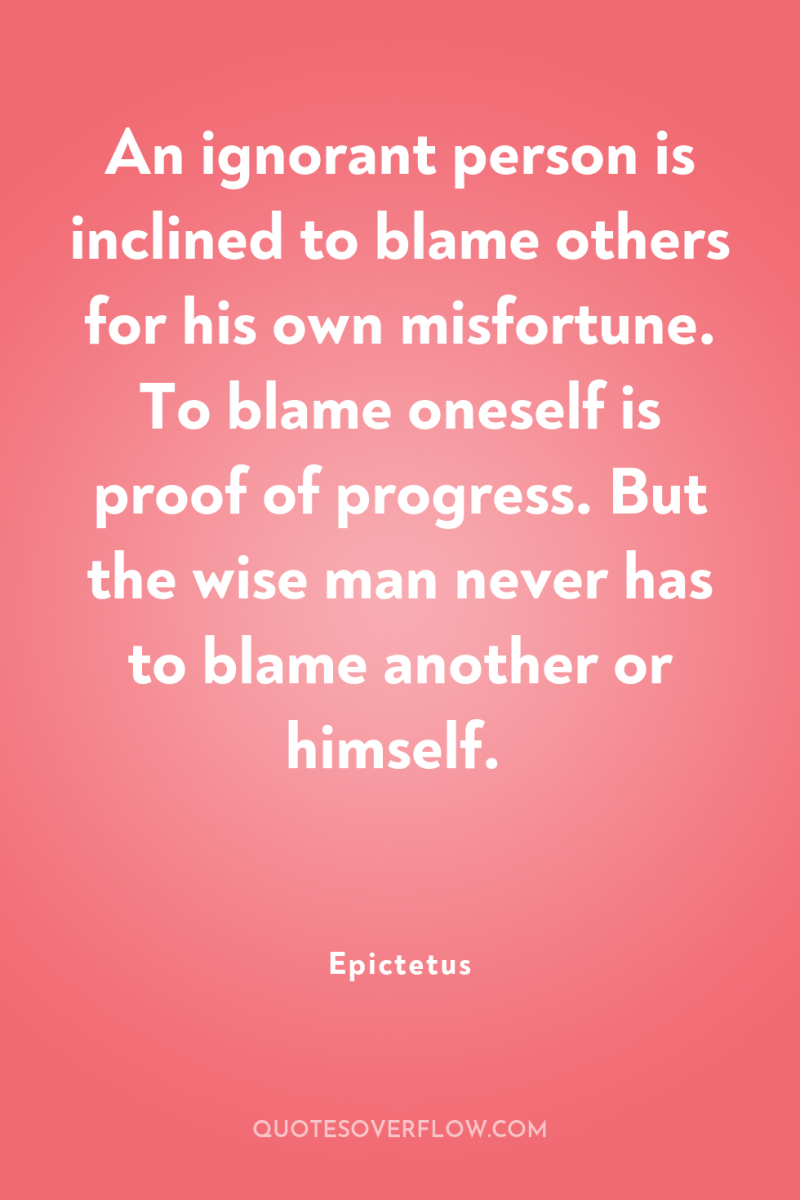1
Don't just say you have read books. Show that through them you have learned to think better, to be a more discriminating and reflective person. Books are the training weights of the mind. They are very helpful, but it would be a bad mistake to suppose that one has made progress simply by having internalized their contents." Translation by Sharon LebellEpictetus
2
Remember, it is not enough to be hit or insulted to be harmed, you must believe that you are being harmed. If someone succeeds in provoking you, realize that your mind is complicit in the provocation. Which is why it is essential that we not respond impulsively to impressions; take a moment before reacting, and you will find it easier to maintain control.Epictetus

3
An ignorant person is inclined to blame others for his own misfortune. To blame oneself is proof of progress. But the wise man never has to blame another or himself.Epictetus
4
If you want to make progress, put up with being perceived as ignorant or naive in worldly matters, don't aspire to a reputation for sagacity. If you do impress others as somebody, don't altogether believe it. You have to realize, it isn't easy to keep your will in agreement with nature, as well as externals. Caring about the one inevitably means you are going to shortchange the other.Epictetus
5
Remember to act always as if you were at a symposium. When the food or drink comes around, reach out and take some politely; if it passes you by don't try pulling it back. And if it has not reached you yet, don't let your desire run ahead of you, be patient until your turn comes. Adopt a similar attitude with regard to children, wife, wealth and status, and in time, you will be entitled to dine with the gods. Go further and decline these goods even when they are on offer and you will have a share in the gods' power as well as their company. That is how Diogenes, Heraclitus and philosophers like them came to be called, and considered, divine.Epictetus
6
The first and most important field of philosophy is the application of principles such as “Do not lie.” Next come the proofs, such as why we should not lie. The third field supports and articulates the proofs, by asking, for example, “How does this prove it? What exactly is a proof, what is logical inference, what is contradiction, what is truth, what is falsehood?” Thus, the third field is necessary because of the second, and the second because of the first. The most important, though, the one that should occupy most of our time, is the first. But we do just the opposite. We are preoccupied with the third field and give that all our attention, passing the first by altogether. The result is that we lie — but have no difficulty proving why we shouldn’t.Epictetus
7
Now is the time to get serious about living your ideals. How long can you afford to put off who you really want to be? Your nobler self cannot wait any longer. Put your principles into practice — now. Stop the excuses and the procrastination. This is your life! You aren’t a child anymore. The sooner you set yourself to your spiritual program, the happier you will be. The longer you wait, the more you’ll be vulnerable to mediocrity and feel filled with shame and regret, because you know you are capable of better. From this instant on, vow to stop disappointing yourself. Separate yourself from the mob. Decide to be extraordinary and do what you need to do — now. .Epictetus
8
Don’t just say you have read books. Show that through them you have learned to think better, to be a more discriminating and reflective person. Books are the training weights of the mind. They are very helpful, but it would be a bad mistake to suppose that one has made progress simply by having internalized their contents.Epictetus